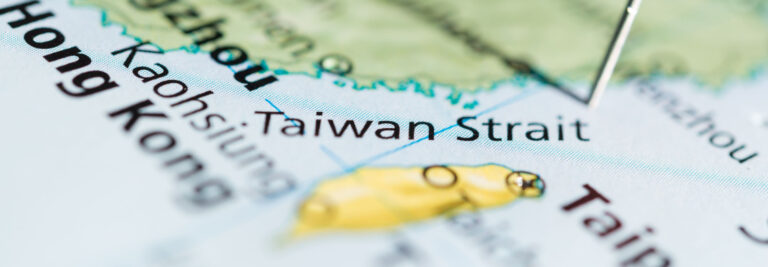Speaking at the ceremony announcing the signing of the US-Taiwan memorandum of understanding on coast guard cooperation, Taiwan Foreign Minister Joseph Wu (吳釗燮) vowed to work with the United States “to together defend our commonly cherished values of democracy, freedom, human rights, and the rules-based order.” A commitment to “upholding the rules-based international order” is a running theme in the statements of senior Taiwanese officials. Addressing the Copenhagen Democracy Forum last month, President Tsai Ing-wen (蔡英文) herself fretted that “authoritarian states are now looking to alter the rules-based global order by taking advantage of the COVID-19 pandemic.” On the one hand, it is natural for a small state like Taiwan to be invested in a rules-based order, given that those rules—in theory—also bind bigger countries to certain modes of interaction. It puts everybody—in theory—on equal footing. On the other hand, the current order is inimical to Taiwan’s interests in important ways, mainly due to Taiwan’s exclusion from key parts of that order. Perhaps it is time for Taiwan to move on from pursuing participation in an order that rejects it, and instead advance creative proposals for overhauling that order entirely.
How The Rules-Based Order Fails Taiwan
On May 24, 2021, the World Health Assembly (WHA) decided against even discussing Taiwan’s inclusion as an observer in this year’s meeting. For the fifth consecutive year, and the second time now in the midst of a global pandemic, Taiwan has been excluded from partaking in the conversation about ensuring global public health. The past twelve months have been a particularly frustrating time for Taipei and featured a shameful display from the World Health Organization (WHO). Last year, when Taiwan was raising red flags about a mysterious disease in Wuhan, managing an exemplary response to COVID-19, and donating personal protective equipment around the world, the WHO did not welcome Taiwan’s participation at the WHA. Today, when Taiwan is dealing with a substantial outbreak for the first time, the WHO is still keeping Taiwan at arm’s length.
Nor is there any indication the United States is prepared to get serious about solving this problem. The Biden Administration, like the Trump Administration before it, is supportive of Taiwan’s participation. In comments at a recent German Marshall Fund event, Jennifer Hendrickson White, a senior policy advisor at the US Mission to the United Nations, made clear the United States would continue to “advocate” for Taiwan’s inclusion—by making the case that its inclusion would bring tangible benefits to international organizations and their members, and by arguing that its inclusion is consistent with UN resolutions. The inclusion in this year’s G7 Foreign and Development Ministers’ statement of a call for “Taiwan’s meaningful participation in the World Health Organization forums and the World Health Assembly” was something of a coup for the United States and for Taiwan.
But this kind of advocacy will only go so far. Washington and like-minded countries are unlikely to win this argument when China is relying on coercion to ensure support for its position. In this case, competition on Beijing’s terms is probably necessary if Taiwan is to be invited over Chinese objections. It is not clear that Taiwan’s partners have any appetite for such a competition.
It is not only in the realm of global public health that the presiding international order is not conducive to Taiwan’s interests. Beijing has also taken advantage of Taipei’s exclusion from the International Civil Aviation Organization (ICAO). During the first week of January 2018, China’s Civil Aviation Administration unilaterally opened the M503 civilian air path through the Taiwan Strait to northbound traffic (it had previously only been opened to southbound flights) and announced three new west-east feeder routes to the M503. The CAA did so in violation of a 2015 cross-Strait agreement to consult ahead of such moves. Taiwan’s concerns were twofold, as I described later that year:
Taiwan has raised concerns of both safety—the new routes run by Taiwan’s offshore islands, which have their own airports—and security. In particular, those responsible for ensuring Taiwan’s security worry that PLA aircraft may take advantage of the new routes to approach the island under the guise of commercial airliners […] Moreover, should the PLA ever launch an invasion and successfully establish a beachhead on Taiwan, Beijing is likely to use civilian airliners as complements to military transport in order to ferry people and supplies across the Strait; civilian pilots using the newly announced air routes would be, in effect, training for an invasion.
Taiwan’s appeals to ICAO to mediate the cross-Strait dispute fell on deaf ears. Indeed, ICAO failed to take any action in response to China’s provocation, despite the CAA’s apparent violation of the ICAO Air Traffic Services Planning Manual. Then, in 2019, the Air Traffic Management Sub-Group of the Asia Pacific Air Navigation Planning and Implementation Regional Group, an ICAO body, issued a report listing the “full utilization of Route M503 in 2018” as a factor contributing to reduction in major air delays in the region. In other words, the new air traffic paths received the ICAO stamp of approval. Meanwhile, China has continued to ensure that Taiwan is not invited to observe triannual meetings of the ICAO assembly.
Taiwan may now be watching ICAO with renewed wariness as the organization struggles to deal with the actions of one of its members. In the wake of Belarus’s apparent state-sponsored hijacking of a flight of the Irish airline Ryanair, ICAO indicated it was “strongly concerned” in what was still a mildly worded statement. Following an emergency meeting on Friday, May 27, the ICAO Council announced it would undertake a “fact-finding investigation,” though it was unclear what form that investigation would take, whether Minsk and Moscow would cooperate, and with how much urgency the investigation would proceed.
If ICAO cannot restrain its smaller members from infringing on the rights of other members, there is no hope that ICAO will restrain China in the Taiwan Strait (or anywhere else, for that matter). What’s more, Taiwan now must worry about “authoritarian learning,” as Brian Klaas points out in the Washington Post, noting that “dictators across the world look to one another for cues.” Russia and China unsurprisingly demurred from criticizing Belarus. That may largely be about supporting a fellow authoritarian regime, but Moscow and Beijing may have also seen something they might like to emulate. Given that Taiwanese carriers regularly fly over Chinese territory en route to other international destinations, Taipei will now have new cause for worry about the security of its airliners, which fly over Chinese territory as a matter of course, and the crew and passengers onboard. Indeed, on May 27, a Chinese Airlines flight carrying vaccines from Luxembourg via Dubai avoided flying through Chinese airspace in a deviation from usual practice.
Next Steps
If the United States and its partners are not prepared to buy votes and twist arms to secure Taiwan’s invitation to international fora, and if Taiwan’s friends are incapable of defending or unable to defend Taiwan’s interests within those fora, new approaches are needed.
First, the United States should consider convening meetings immediately preceding international assemblies that include those countries supportive of Taiwan’s inclusion. This would require time and resources, but that should be a minor obstacle if Taiwan’s exclusion from bodies like the WHO, ICAO, and INTERPOL is a national security concern (which it is). This would allow Taiwan, its diplomatic allies, and supportive partners to engage directly on issues of mutual concern in multilateral settings and, where appropriate and feasible, to more effectively coordinate on advancing shared interests at the WHA and similar gatherings.
Taiwan, for its part, should consider whether it can encourage changes to the rules-based order that ensure its own interests are better protected. Because Taiwan sits outside that rules-based order, it can feel free to develop a series of proposals aimed at reforming and perhaps overhauling it. The Ministry of Foreign Affairs should put forth ideas of its own—it might even consider an internal essay competition on remaking the global order—while also commissioning studies from independent academic and policy experts.
Ideally, those tackling this challenge would both think small (say, standardizing rules on observership across UN agencies) and think big (abolishing the UN and starting from scratch). Taiwan is by no means invested in the UN system as it currently exists, and thus likely can bring more creativity to tackling its myriad problems. And while Taipei is not well-positioned to advance its favored reforms, the United States and other partners are. Washington should welcome good ideas that it can support, and that serve American interests. Taiwan should strive to provide them.
The main point: Perhaps it is time for Taiwan to move on from pursuing participation in an order that rejects it, and instead advance creative proposals for overhauling that order entirely.



